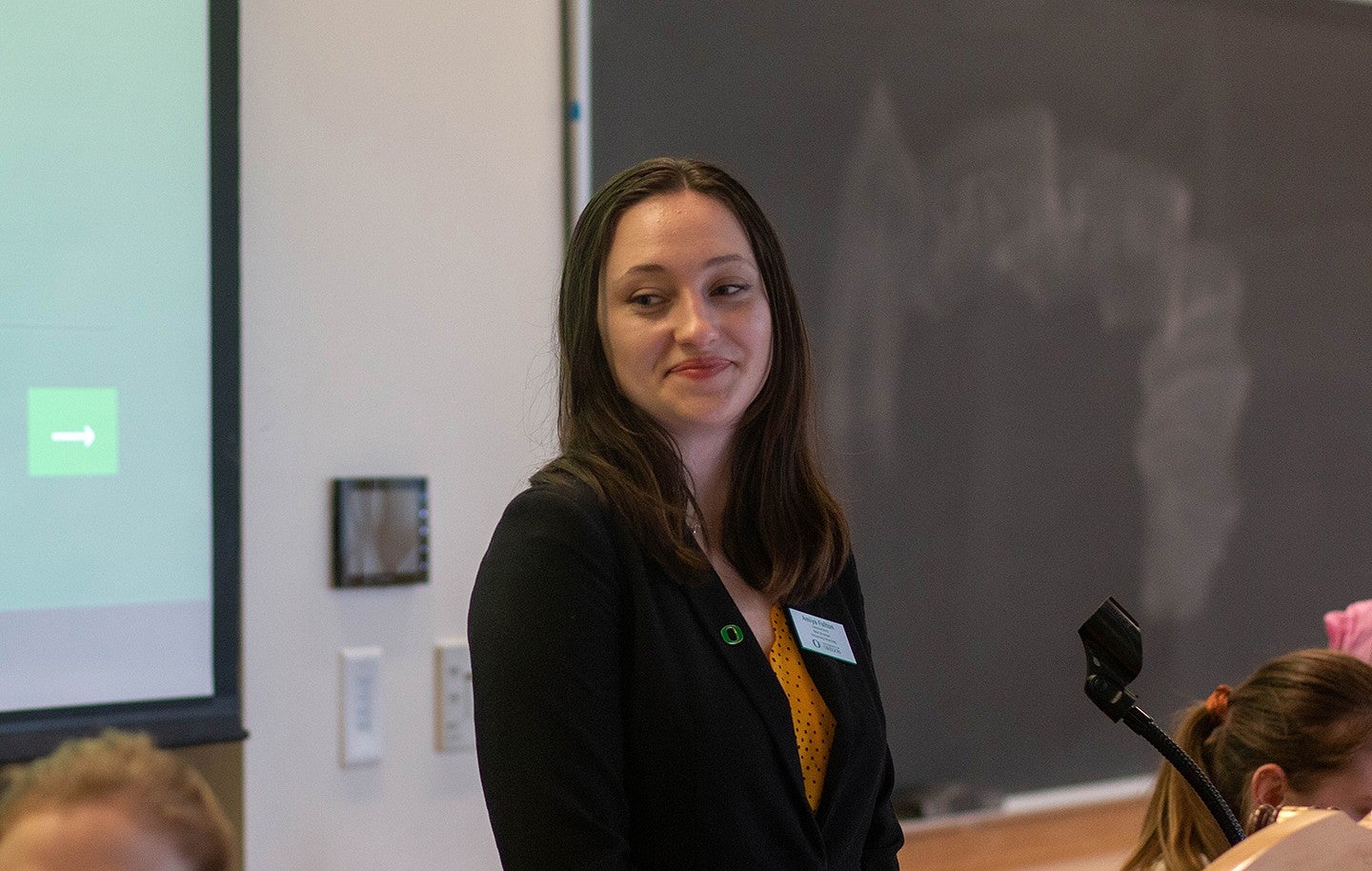
The personal touch
While sitting in on search committees for new hires in UO’s housing department, Amiya Fulton came to realize that she wasn’t so interested in pursuing finance after all. It was her second year, and after taking one finance class for her business administration major, she realized that numbers weren’t for her.
Her role in the Residence Hall Association helped her discover the sector of business she was most drawn to: human resources. While helping conduct interviews for the individuals who would become her bosses, her passion sparked. “I really loved how HR is the sector of business that focuses only on the people,” Fulton says.
Between helping people find the job that is perfect for them and helping others to become their best selves in the work that they do, Fulton is drawn to making sure others around her thrive. Beyond that, she’s always considering how to make the workplace a safe and equitable environment. “I want to help create a happy place for people to come to work,” she says.
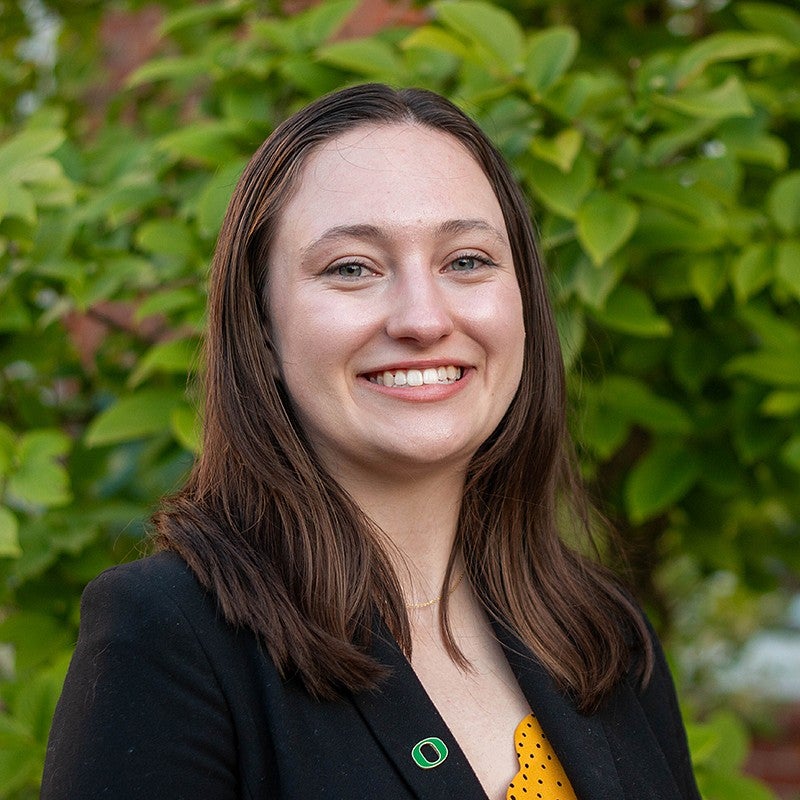
Amiya Fulton
Describe your experience at CHC: Personalized, supportive, challenging, interdisciplinary
Your advice for the thesis project: Write early and often. The writing doesn’t have to be perfect or polished, but the sooner you begin writing the actual thesis, the better. Don’t put off the writing because you “aren't ready” or the project isn’t “complete enough.” Just get those words on paper.
This summer, I can’t wait for: Moving into my first apartment with my boyfriend, starting a new job, getting super into knitting, making new friends, getting some sun at the lake, and further exploring all the cool little shops and restaurants around Eugene.
What I’ll miss most the most about CHC/UO: The people. My mentors, professors, friends, advisors, supporters. I’ve loved my time here in the CHC and at the UO. I want to give back to students as a mentor, professional connection, and friend like so many alumni did for me.
Where I’m headed next: I have accepted an office administrator position with JPMorgan Chase & Co. to work at one of their wholly owned subsidiaries, Campbell Global, in Junction City.
After switching gears from a focus on finance to a specialization in human resources, Fulton hasn’t looked back. She graduates from the CHC with a bachelor’s in business administration with a concentration in marketing. Her thesis, “The Next Chapter: A Comparative Review of the Evolving Resident Assistant Role at the University of Oregon,” is informed by her years of specialization in HR. Her idea was to redefine the role of the resident assistant in University Housing.
Once a leader, always a leader
Growing up, Fulton’s family moved around a lot due to her parents’ careers as doctors. Seeing textbooks laid open to photos of lacerated arms and other catastrophes made it clear to Fulton that she didn’t want to become an anesthesiologist or physician’s assistant like her mom and dad. Instead, she spent her days spending time with her little sister.
She says there’s nothing like being an older sister and that “you almost become like a third parent sometimes.” Acting as a role model, she recalls always reaching milestones and setting examples for her sister, even if it meant learning lessons the hard way. “As the oldest, you don’t have someone to look up to,” she says.
She was the extroverted one, always asking her sister to hang out even when she was exhausted. “I would pester her constantly to hang out and play, and she would hide from me just to get in a 15-minute nap,” Fulton recalls. “I’ve been very social and people-centered since birth.”
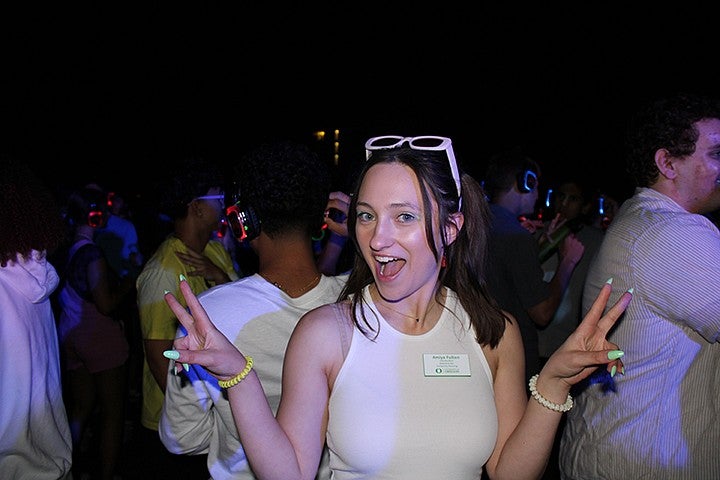
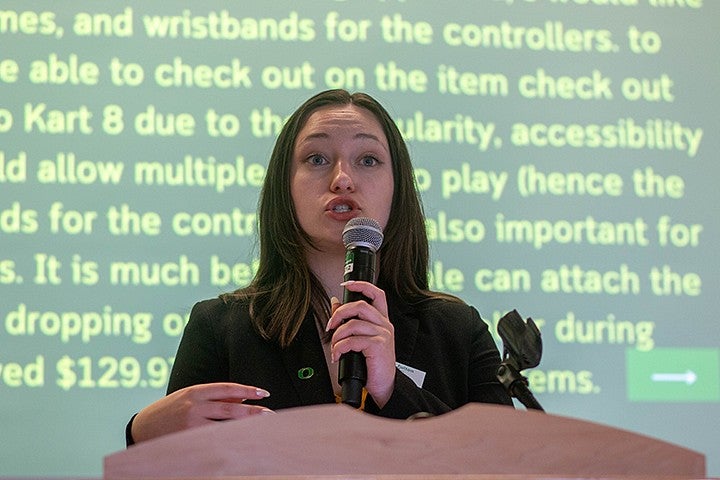
In elementary school, Fulton would run the playground like an HR professional. “I would recruit other kids to play and form small functional organizations like bakeries and stores where everyone had a specific job,” she says. “I wouldn't exclude anyone because I wanted everyone to be a part of our playgroup and feel included.”
Being a people person, Fulton frequently found herself in leadership roles throughout her education. Serving as her high school’s student body president in the 2020-21 school year, she faced challenges connecting with the student body, considering the online format her school adopted the year the pandemic struck.
As Roseburg High School returned to a hybrid format later that same school year, Fulton worked to create a program where student representatives would reach out to students who hadn’t returned to school—not disciplinarily but as an act of care. They’d ask questions: “Are you okay? How are you doing? Is there anything we can do to help? We miss you, we noticed that you’re not here,” Fulton remembers.
The program worked well, contributing to helping students feel a sense of belonging on campus while students were trying to stay afloat through the pandemic. “It received a lot of positive feedback,” Fulton says, “ It was just really sweet that there were students willing to just notice that people weren't there and check in on them.”
When Fulton came to the CHC, she continued her involvement in leadership by acting as a facilitator for UO’s Get Explicit 101 program. The workshop is a mandatory session for all incoming students that introduces UO’s standards and expectations to prevent sexual violence. As a facilitator for the program, Fulton led discussions on everything from boundaries and consent to social norms and bystander intervention.
“I wanted to be there to help make the campus a safer and more equitable place for everyone,” Fulton says. “We were fostering the culture that we have here at the UO, that Ducks take care of each other.”
Fulton's role as a Get Explicit 101 facilitator tied directly into what made her excited to pursue a career in HR. “It revolves a lot around confidentiality, empathy and sensitivity,” she says. “I utilized a lot of that during Get Explicit because of the sensitive nature of the topics we were talking about.”
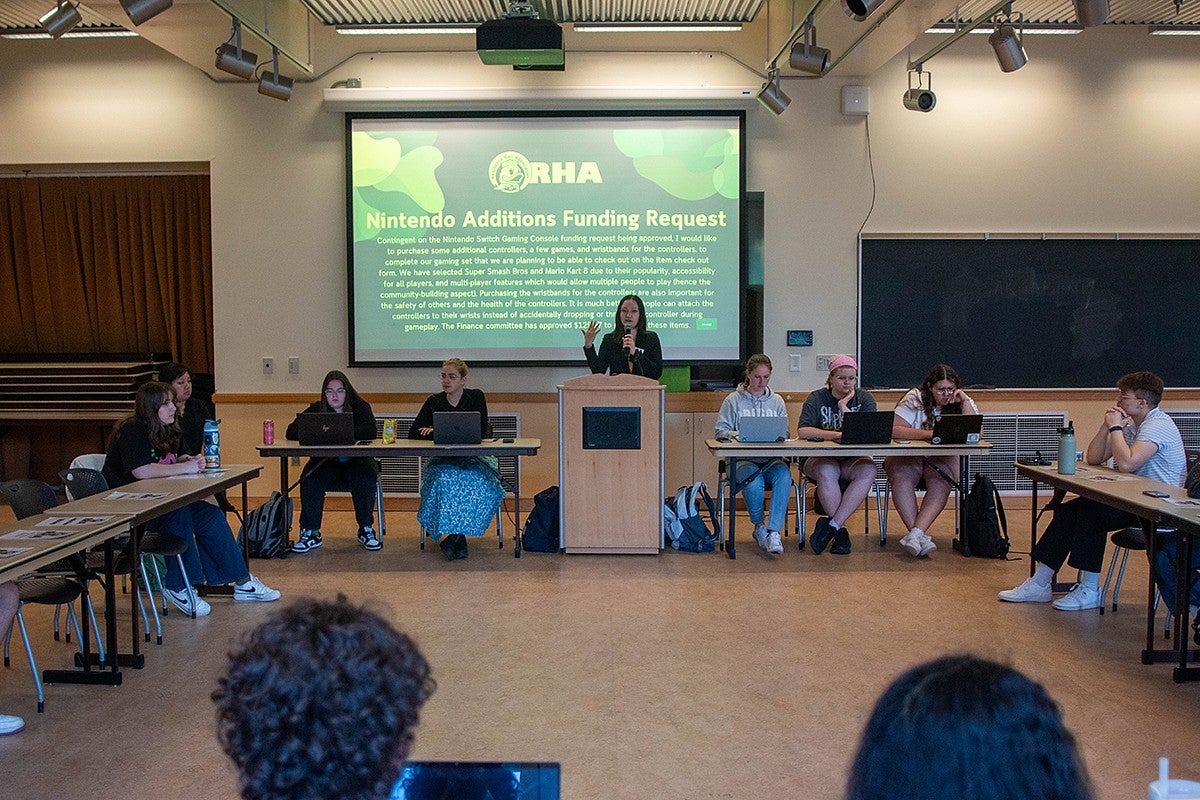
The Honors College helped her find a community of like-minded students with whom she was comfortable. Between being engaged in her classes and participating in CHC thesis writing circles, she was always pushed to be the best she could be academically. “We would study together, we would push each other more in our classes,” Fulton says. “It’s nice to be around people who kind of have the same values and mindset.”
During her sophomore year, Fulton joined RHA as the associate director of public relations. She later became the director of the organization, a role that helped inform her thesis as she examined student leadership in the resident assistant role and how it could be improved.
Jessica Winders, the associate director for academic residential research initiatives at UO, worked closely with Fulton and served as her thesis advisor. “My first impression was that she was a warm-hearted person and was capable,” Winders says. “She already had ideas of what she wanted to do with her project and was self-led throughout the year, setting and reaching her own milestones.”
Fulton says that her best memories in college have come from her time spent with the RHA. “My degree, my thesis, my accomplishments are all reflections of the fact that I had a lot of people who believed in me and lifted me up,” she says.
Redefining roles in her thesis
As a member of RHA, Fulton didn’t become a resident assistant but worked closely with them during her time at the housing department. “Amiya’s proximity to student leaders gave her the ability to speak to RAs as a third party with lots of insight into the unique workplace challenges that RAs face,” Winders says.
She took an in-depth look at the role and explored the changes happening in residential life for students. In taking a social science approach to executing her research, she gathered perspectives from current RAs about what works well and what could be done better.
“Residence life is driven by the needs of students who live on campus,” Winders says. “Amiya’s thesis has provided a great jumping off point for the department to explore new ways of doing things as it relates to the RA role.”
The RA role is complicated, so it made sense for Fulton to approach the thesis as she would her HR work. “I looked at the role itself, how RAs are compensated, how the student union is playing a role, and the current state of what it's like to actually be an RA,” she says.”
By searching for new opportunities for growth, Fulton’s thesis will be used to define the RA role in the future. “I’m really hoping that people will have this discussion or have questions and really talk about their thoughts on redefining the role,” Fulton says. “I really didn’t want my thesis to be published and then be locked away in an archive for a million years.”
Fulton noticed consistencies as she conducted her research. Namely, the RAs she interviewed agreed that they felt disconnected from the housing professional staff who make the decisions at higher levels. “When I asked about the unionization movement, 63% of them had said that they supported the movement because they had a negative interaction with pro-staff,” Fulton says.
Fostering closer connections between RAs and professional staff members is one example of the way the housing department is already planning to implement Fulton’s thesis findings for next year. Between new open-door office hours and more casual, informal events, they’re already considering how things can be improved. “It’s going to be important for pro-staff to meet with RAs on a basis that's not training or meeting with them because they did something wrong or because there was an incident or emergency,” Fulton says.
From her conversations with professional housing staff, Fulton says that they’re also considering creating seats for RAs to contribute to the decision-making process for departmental committees. “Having RA voices in those decisions will help them tailor their resources and their strategies to help RAs in the future,” she says.
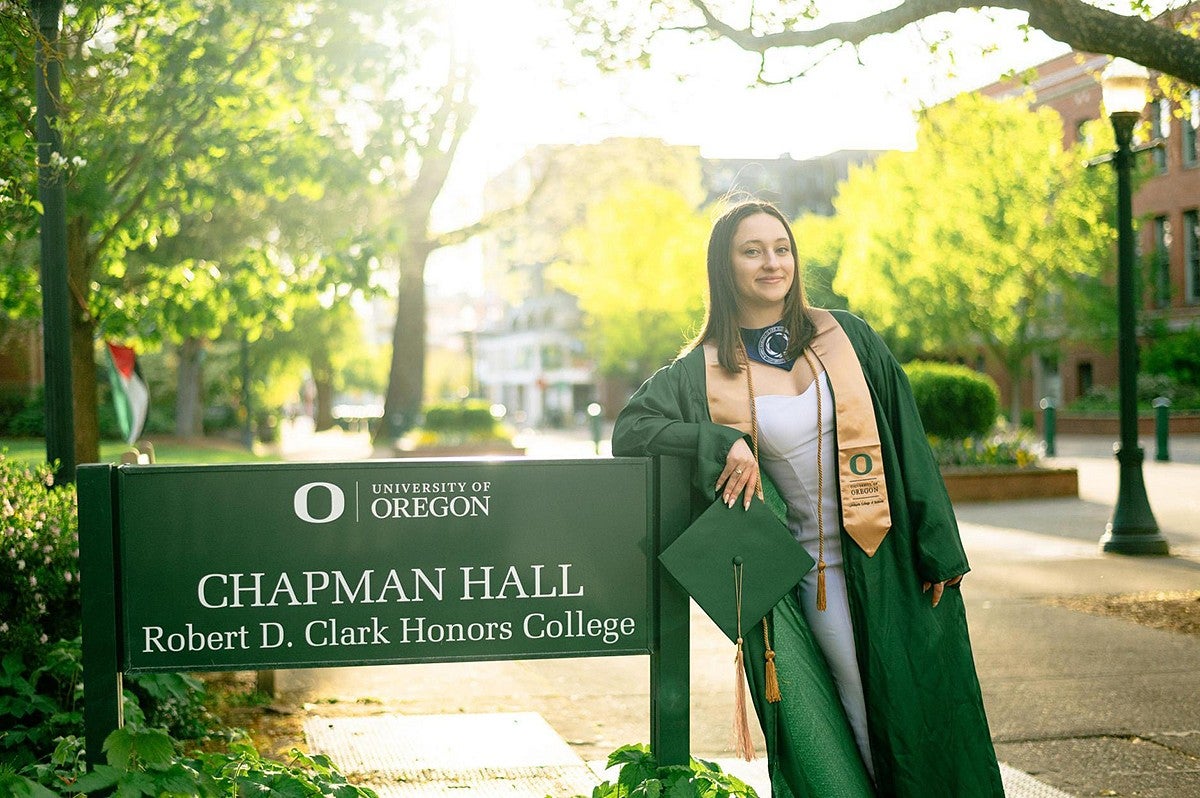
The next step for Fulton after graduation is work, she says. She recently accepted a position at JPMorgan Chase & Co., where she’ll serve in an office management position for Campbell Global in Junction City. It’s a short commute from her new apartment in Eugene, where she’ll be moving with her boyfriend after graduation.
In the long term, Fulton sees herself staying in HR. “I want to get to a place where I can be influential for a department,” she says. “The kind of position where I can tailor the department to my vision.”
Regardless of how far her work takes her, Winders knows she’ll have no trouble thriving. “My favorite thing about Amiya is her energy. She is driven, friendly, capable, and kind,” Winders says. “Her genuine interest in people comes through in all of her interactions.”

